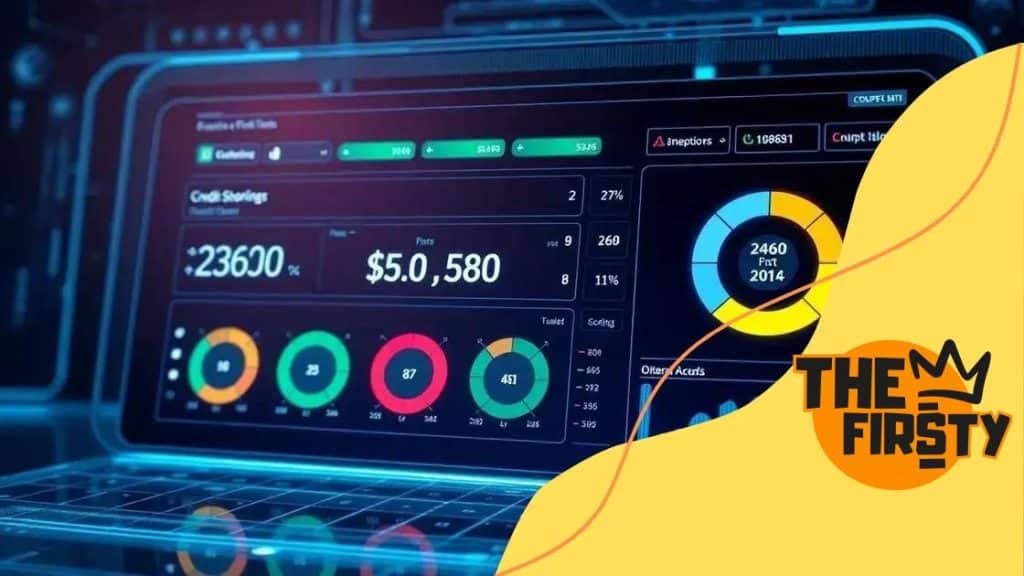How AI is improving credit scoring systems effectively

Anúncios
AI is improving credit scoring systems by enhancing accuracy, speeding up loan approvals, and increasing access to credit, while addressing challenges like data bias and ensuring transparency.
How AI is improving credit scoring systems is a game changer in the finance sector, making processes smarter and fairer. Have you ever wondered how technology can influence your credit score? Let’s dive into how AI is reshaping the way lenders evaluate creditworthiness.
Anúncios
Overview of AI in finance
Understanding the role of AI in finance is essential for grasping how it transforms the industry. AI technology is revolutionizing financial services, making them more efficient and personalized. It enhances analytical capabilities, allowing for better decision-making based on data.
What is AI in finance?
AI in finance refers to the use of algorithms and machine learning to analyze large data sets and make predictions. Financial institutions leverage this technology to detect fraud, personalize customer experiences, and streamline operations.
Key Benefits of AI in Finance
- Improved decision-making through accurate data analysis.
- Enhanced fraud detection by identifying patterns in transactions.
- Automation of repetitive tasks, leading to cost savings.
Moreover, AI algorithms can assess customer creditworthiness quickly and accurately, reducing the time needed for loan approvals. This capability not only speeds up the lending process but also provides more inclusive access to credit for individuals who may have been overlooked in traditional scoring systems.
Anúncios
AI also allows for real-time insights into market trends. Investors can utilize these insights to make informed decisions swiftly, adapting to changes in market dynamics with greater agility. As AI technologies advance, their applications within finance continue to expand, driving innovations that improve service and efficiency.
Ultimately, as we explore the impact of AI in finance, it becomes clear that its integration is not just a trend but a fundamental shift in how financial services operate, shaping the future landscape of the industry.
How AI enhances credit risk assessment
AI plays a critical role in how credit risk assessment is conducted today. By using advanced algorithms, financial institutions can analyze large amounts of data quickly. This analysis helps them make better decisions about lending.
Understanding Credit Risk Assessment
Credit risk assessment involves evaluating the likelihood that a borrower will default on a loan. Traditional methods relied on manual reviews of credit histories and financial records. However, with AI, this process becomes much more streamlined and accurate.
Benefits of AI in Credit Risk Assessment
- Increased accuracy in predicting defaults.
- Faster analysis of borrower data for quick credit decisions.
- Identification of trends and patterns that human analysts may miss.
AI systems look at various factors, including income, spending habits, and even alternative data sources like social media activity. This makes the assessment more holistic and fair, particularly for individuals with limited credit histories. For example, someone new to credit may still be eligible for a loan based on their reliable payment records in other areas.
Moreover, AI can continuously learn from new data. This means that as additional information becomes available, the models can adjust their assessments, improving their effectiveness over time. By utilizing machine learning, lenders can better manage risk and tailor their offerings to meet customer needs.
This innovative approach not only benefits financial institutions but also helps consumers gain better access to credit. With AI, the lending process becomes more inclusive, allowing more people to participate in the financial system.
Benefits of AI in credit scoring

The benefits of AI in credit scoring are significant and far-reaching. With the use of advanced algorithms, AI is reshaping how creditworthiness is assessed, leading to more accurate and fair evaluations.
Enhanced Accuracy
One of the main advantages of AI is its ability to analyze vast amounts of data quickly. This results in a more precise understanding of potential borrowers. Traditional credit scoring models often rely solely on historical data, which can be limiting. In contrast, AI incorporates various factors, providing a more comprehensive view.
Faster Processing Times
AI technology streamlines credit scoring processes, significantly reducing approval times. Lenders can make decisions almost in real-time, which benefits consumers eager for prompts. For example, an applicant might receive loan approval in minutes instead of days.
Greater Inclusivity
- AI can assess non-traditional data points.
- It helps individuals with limited or no credit history.
- More people can qualify for loans than with traditional models.
By evaluating alternative data such as utility payments or rental history, AI helps those who might otherwise be excluded from the lending process. This creates opportunities for underrepresented groups, making the financial landscape more equitable.
Moreover, using AI reduces biases that can occur in human assessments. Algorithms can be designed to overlook factors that should not influence creditworthiness, ensuring all applicants are treated fairly. This approach increases trust in lenders and empowers consumers by presenting them with opportunities they may have previously thought were unattainable.
Overall, the adoption of AI in credit scoring is paving the way for a more efficient, fair, and accessible financial system. The interconnectedness of technology and finance will continue to evolve, generating more positive outcomes for both lenders and borrowers.
Challenges and limitations of AI in credit scoring
The challenges and limitations of AI in credit scoring are essential to understand as this technology evolves. While AI brings many benefits, it also faces significant hurdles that can impact its effectiveness.
Data Quality and Availability
One major challenge is the quality of data used in AI models. Algorithms require accurate and comprehensive data to make reliable assessments. If the data is biased or incomplete, it can lead to incorrect conclusions about a borrower’s creditworthiness.
Algorithmic Bias
Another critical concern is algorithmic bias. AI systems may inadvertently learn from existing biases present in the training data. This can result in unfair treatment of certain groups, reinforcing inequalities. For instance, if historical data reflect discriminatory lending practices, the AI may replicate these biases in its scoring.
Regulatory Challenges
- Lack of clear regulations on AI usage in finance.
- Challenges in ensuring transparency in decision-making processes.
- Concerns over data privacy and security.
Navigating the regulatory landscape presents difficulties for financial institutions that rely on AI for credit scoring. Compliance with existing laws while pushing for innovation is a delicate balance. Ensuring transparency in how AI makes decisions is crucial for building trust with consumers.
Moreover, AI models can sometimes operate as “black boxes.” This means that the reasoning behind their decisions isn’t always clear, which can raise concerns for both regulators and borrowers. If a consumer is denied credit, they may find it difficult to understand why, leading to frustration and mistrust.
Additionally, not all financial institutions have the same access to advanced technology and data. Smaller banks and credit unions may struggle to implement AI effectively. This discrepancy can widen the gap between larger and smaller institutions, impacting competition in the market.
Despite these obstacles, ongoing research and development aim to address these issues. By improving data quality, addressing bias, and creating clearer regulations, the potential of AI in credit scoring can be realized while minimizing potential risks.
The future of AI in credit evaluations
The future of AI in credit evaluations holds great promise for the financial industry. As technology evolves, AI will continue to reshape how borrowers are assessed, making the process more efficient and trustworthy.
Advancements in Machine Learning
Machine learning algorithms are becoming increasingly sophisticated. These advancements will enable AI to analyze data with greater precision. Future models will likely incorporate even more diverse data sources, offering a broader understanding of credit risk. This could include data from social media, transactional records, and even behavioral patterns.
Personalized Lending Options
As AI models improve, lending will become more personalized. Lenders will be able to tailor their products to individual consumer needs, helping borrowers find loans that best suit their financial situations.
- Customized loan terms based on individual profiles.
- Competitive interest rates adjusted for risk.
- Flexible repayment options to match borrower capabilities.
Through this personalized approach, AI can enhance the overall borrowing experience. Consumers will feel more understood and supported by lenders, leading to stronger relationships.
Enhanced Risk Management
In the future, AI’s ability to predict defaults will be even more refined. Enhanced risk management strategies will help lenders make informed decisions that protect both their interests and those of borrowers. By using predictive analytics, lenders can anticipate potential issues before they arise and take proactive measures.
Additionally, transparency in AI processes will be crucial. Consumers will demand to understand how their data influences credit evaluations. This need for clarity will encourage institutions to adopt fair AI practices and build consumer trust. The focus on ethical AI will guide the development of systems that prioritize fairness and accountability.
As we look ahead, the integration of AI in credit evaluations represents a significant shift towards more equitable lending practices. By embracing innovation, the financial sector can create a system that better serves the needs of diverse populations, enabling more people to access the credit they require.
In conclusion, the integration of AI into credit evaluations is transforming the financial landscape. This technology brings accuracy, speed, and inclusivity to the lending process. However, challenges like data bias and transparency must be addressed. Looking ahead, AI has the potential to foster a more equitable financial system that adapts to the needs of diverse borrowers. By focusing on innovation and ethical practices, we can ensure that advancements benefit everyone in the credit system.
FAQ – Frequently Asked Questions about AI in Credit Scoring
How does AI improve credit scoring accuracy?
AI analyzes large amounts of data more precisely than traditional methods, leading to more reliable assessments of creditworthiness.
What are the main benefits of using AI in credit evaluations?
The main benefits include faster loan approvals, increased inclusivity for borrowers, and enhanced risk management.
What challenges does AI face in credit scoring?
Challenges include data quality issues, algorithmic bias, and the need for regulatory clarity regarding AI usage in finance.
Will AI make credit evaluations more transparent?
Yes, by developing clearer algorithms and practices, AI can enhance transparency, helping consumers understand how their credit evaluations are made.





